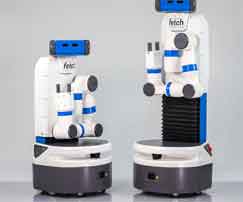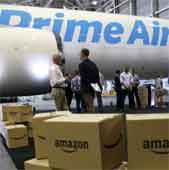| |
|
| |
|
 |
Supply
Chain by the Numbers |
| |
|
| |
- July 8, 2021
|
| |
|
| |
|
| |
|
| |
Zebra Enters Mobile Robot Market; Food Companies Forward Buying in Face of Inflation; Big Interest in Converting Idled Passenger Planes to Haul Cargo; Ship that Blocked Suez Canal Finally Freed |
| |
|
| |
| |
| |
| |
$290 Million |

|
| That’s how much Zebra Technologies is paying to acquire the 95% of mobile robot maker Fetch Robotics, in a deal announced last week. The all-cash deal is expected to close in Q4. For Zebra, the move is another step to expand from its long time roots in data collection, focused on bar code scanners, RFID readers and mobile wireless (radio frequency) terminals. Zebra’s move could trigger more acquisitions in the high flying mobile robot market, where the growth of ecommerce and on-going labor shortages are pushing many companies to consider robot technology to drive productivity gains. Several robot providers offer “robots as a service” programs in which shippers can in effect lease robots for a period of time, such as peak season. Part of the appeal of Fetch to Zebra is its broad product line, with different robots for different types of warehouse applications. |
|
|
| |
| |
|
|
 |
| That’s about how much it costs to have a Boeing 767 passenger aircraft converted into a cargo plane – nearly as much as the cost of the used aircraft itself. That according to an article on Business Insider this week on the red hot market for idled aircraft, most of which are stored in Arizona and a few nearby Southwest states. The conversion takes somewhere between 90 and 120 days, and right now there are backlogs at the few companies across the globe that can do the work. One conversion company told Business Insider that it is booked through 2022. In 2020, for example. Amazon bought 11 idled Boeing 767-300ER aircraft from Delta Air Lines and Canada's WestJet to expand its Prime Air fleet. Of course, ecommerce – what else – is fueling the market for planes parked in the desert. "I get calls, still, from people looking for cargo aircraft in the desert and they just don't exist right now," an executive at one airplane storage facility said. |
| |
| |
|
|
| |
| |
15-20% |
 |
That is by how much more Associated Wholesale Grocers, the nation’s largest food middle man, is buying now in iinventory versus normal levels, according to an article this week in the Wall Street Journal. Why? It’s “forward buying” in the face of rapid inflation for many products. Wholesaler SpartanNash in Michigan has bought up around 20 to 25% more than normal, including frozen meat. CEO Tony Sarsam said the "uniquely inflationary period” has caused “a feeding frenzy.” The recent spike in prices and benefits from increasing the size of purchase orders comes as several factors are pushing up costs all the way from farm to store, including rising wages and transportation expense, combined with continues strong demand for many items. Agricultural commodities are way up too, driving costs for food providers as well as grocers. Overall consumer prices rose 0.6% in May, bringing the annual inflation rate to 5%- the highest level since August 2008. The irony: buying ahead to avoid expected price hikes creates shortages which can also drive prices higher. Several retailers told the Journal they are receiving only around 80% of their orders from suppliers as key goods run out. |
| |
| |
| |
| |
| |
|
|
|
| |
 |
 |
| |
 |
![]() |
 |
|
| |
 |
Feedback |
|
|
|
![]()
|
No Feedback on this article yet.
|
|
![]() |
|
|
|
![]() |
 |
![]() |
 |
|
| |